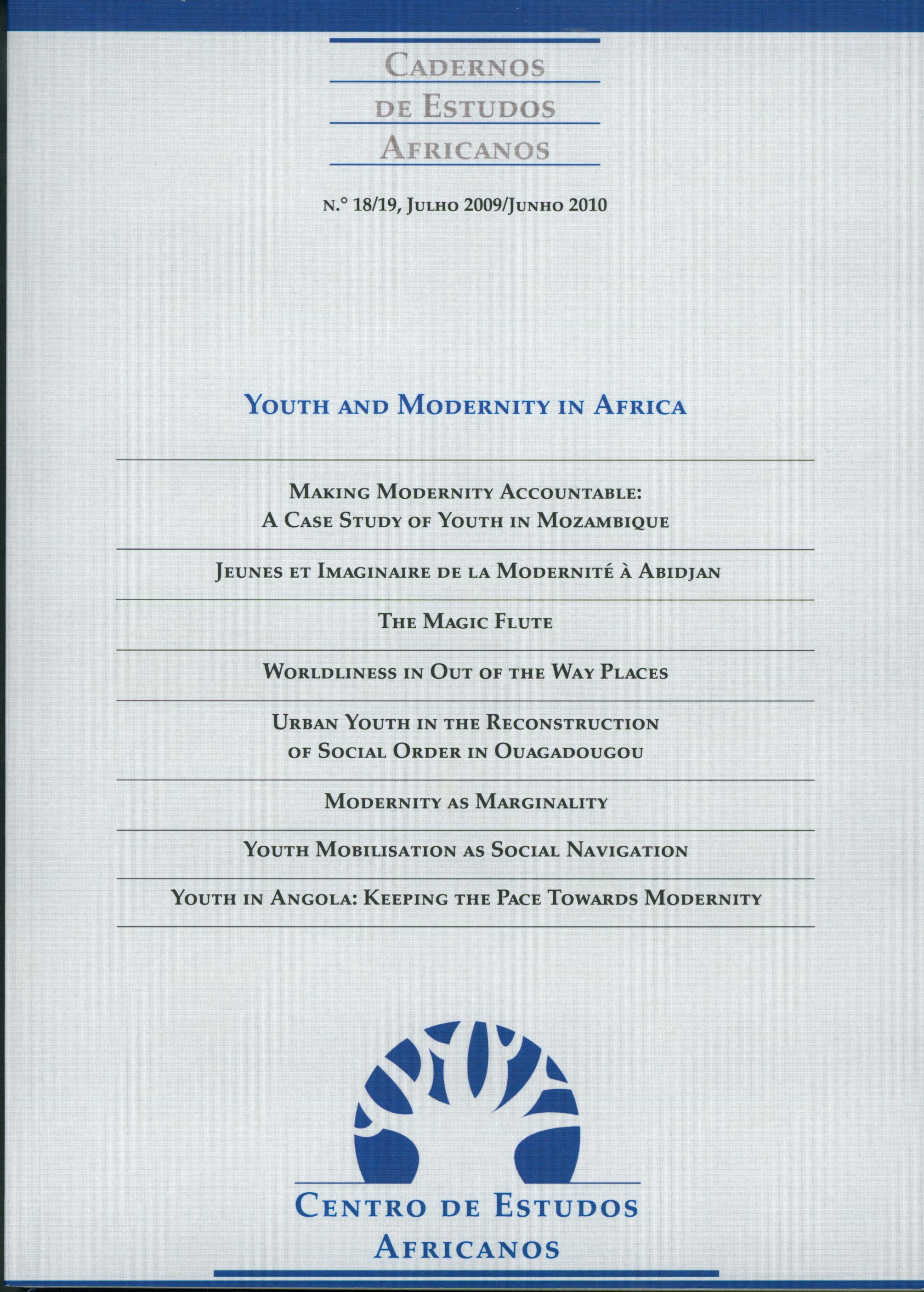Making modernity asscountable: A case study of youth in Mozambique
DOI:
https://doi.org/10.4000/cea.73Palavras-chave:
youth, modernity, NGO, MozambiqueResumo
According to the philosopher Stephen Toulmin there is a standard account of modernity which gives primacy to the written over the oral, the universal over the particular, the general over the local and the timeless over the timely. This paper draws from Toulmin to argue that accounts of modernity in Africa are based on the assumptions of the standard account of modernity to deny modernity to Africa even though these assumptions inhere in actual practices as the analysis of the work of a non-governmental organization operating in Mozambique seeks to document. The paper will therefore argue that modernity is real and that it shows its reality in the way in which particular social conditions and categories are done, i.e. through meanings, methods, motives and the management of the social relationship which they bring forth.Referências
Appiah, Kwame A. (1992). In my father’s house. Africa in the philosophy of culture. London, Methuen.
Bayart, Jean-François (2000). “Africa in the world: A history of extraversion”, African Affairs, 99, 217-267.
DOI : 10.1093/afraf/99.395.217
Comaroff, Jean and Joan Comaroff (eds.) (1993). Modernity and its malcontents. Ritual and power in postcolonial Africa. Chicago, Chicago University Press.
Cooper, Frederick (2002). Africa since 1940 – The past of the present. Cambridge, Cambridge University Press.
Cooper, Frederick (1996). Decolonization and African society. The labor question in French and British Africa. Cambridge, Cambridge University Press.
Eisenstadt, Shmuel N. (2000). “Multiple modernities”, Daedalus, 129 (1), 1-30.
Ferguson, James (1999). Expectations of modernity. Myths and meanings of urban life on the Zambian Copperbelt. Berkeley, University of California Press.
Garfinkel, Harold and Harvey Sacks (1970). “On formal structures of practical actions”, in McKinney, J.C. and E.A. Tiryakian (eds.). Theoretical sociology. New York, Meredith, 338-366.
Garfinkel, Harold (1967). Studies in ethnomethodology. Englewood Cliffs, Prentice Hall.
Geschiere, Peter (1997). The modernity of witchcraft: Politics and the occult in postcolonial Africa. Charlottesville, University of Virginia Press.
Giddens, Anthony (1990). The consequences of modernity. Stanford, Stanford University Press.
Goffman, Erving (1990). Stigma. London, Penguin.
Hester, Stephen and Peter Eglin (1997). “Culture in action: Studies”, in Membership categorisation analysis. Washington, DC, University Press of America.
Horkheimer, Max and Theodor Adorno (1972). Dialektik der Aufklärung. Philosophische Fragmente. Frankfurt am Main, Fischer.
Lepenies, Wolf (ed.) (2003). Entangled histories and negotiated universals. Centers and peripheries in a changing world. Frankfurt am Main, Campus.
Lerner, Daniel (1964). The passing of traditional society. Modernising the Middle East. New York, Free Press of Glencoe.
Macamo, Elísio (2005). “Negotiating modernity. From colonialism to globalization”, in Macamo, Elísio (ed.). Negotiating modernity. Africa’s ambivalent experience. Dakar, CODESRIA/Zed Books, 1-18.
Macamo, Elísio (2003). “Work and societal order in Africa. Negotiating social change”, in Lepenies, W. (ed.). Entangled histories and Negotiated Universals. Frankfurt am Main, Campus, 281-309.
Macamo, Elísio (1999). Was ist Afrika? Zur Kultursoziologie eines modernen Konstrukts. Berlin, Duncker & Humblot.
Macamo, Elísio and Dieter Neubert (2008). “The new and its temptations: Products of modernity and their impact on social change in Africa”, in Adogame, Afe, Magnus Echtler and Ulf Vierke (eds.), Unpacking the new: Critical perspectives on cultural syncretization in Africa and beyond. Hamburg/Münster, Lit, 267-299.
Mamdani, Mahmood (1996). Citizen and subject. Contemporary Africa and the legacy of late colonialism. Kampala, Fountain Pub.
Marx, Karl (1978). “On Imperialism in India”, in Tucker, R. (ed.). The Marx-Engels reader. New York, W.W. Norton, 653-664.
Mudimbe, Valentin Y. (1988). The invention of Africa. Gnosis, philosophy and the order of knowledge. London, James Currey.
Mudimbe, Valentin Y. (1982). L’odeur du père. Essai sur les limites de la science et de la vie en Afrique Noire. Paris, Présence Africaine.
Parekh, Bhikhu (1996). “Moral philosophy and its anti-pluralist bias”, in Archard, David (ed.), Philosophy and pluralism. Cambridge, Cambridge University Press, 117-134.
Toulmin, Stephen (1990). Cosmopolis. The hidden agenda of modernity. New York, The Free Press.
White, Louise (1993). “Vampire priests of Central Africa: African debates about labor and religion in colonial Northern Zambia”, Comparative Studies in Society & History, 35, 746-772.
DOI : 10.1017/S0010417500018697
White, Louise (1995). “Tsetse visions: Narratives of blood and bugs in colonial Northern Rhodesia. 1931-9”, Journal of African History, 36, 219-245.
Wittrock, Bjorn (2000). “Modernity: One, none, or many? European origins and modernity as a global condition”, Daedalus, 129 (1), 31-60.
Annex: Background Material
HIV/SRH Integration site interview to Ms. Badiani, responsible for designing and implementing the national Adolescent Sexual and Reproductive Health/HIV/AIDS programme in Mozambique entitled Geração Biz:
http://www.hivandsrh.org/Voices/Badiani.php
For more information about Geração Biz in Mozambique, see:
http://www.pathfind.org/site/PageServer?pagename=Programs_Mozambique_Projects_GeracaoBiz. (31st October 2008)
Downloads
Publicado
Edição
Secção
Licença
Direitos de Autor (c) 2016 Cadernos de Estudos Africanos

Este trabalho encontra-se publicado com a Licença Internacional Creative Commons Atribuição-NãoComercial-CompartilhaIgual 4.0.
Autorizo a publicação do artigo/recensão submetido do qual sou autor.
Declaro ainda que o presente artigo é original, que não foi objecto de qualquer tipo de publicação, e cedo em exclusivo os direitos de publicação à revista Cadernos de Estudos Africanos. A reprodução do artigo, no todo ou em parte, noutras publicações ou noutros suportes depende de autorização prévia da editora Centro de Estudos Internacionais do Iscte - Instituto Universitário de Lisboa.

